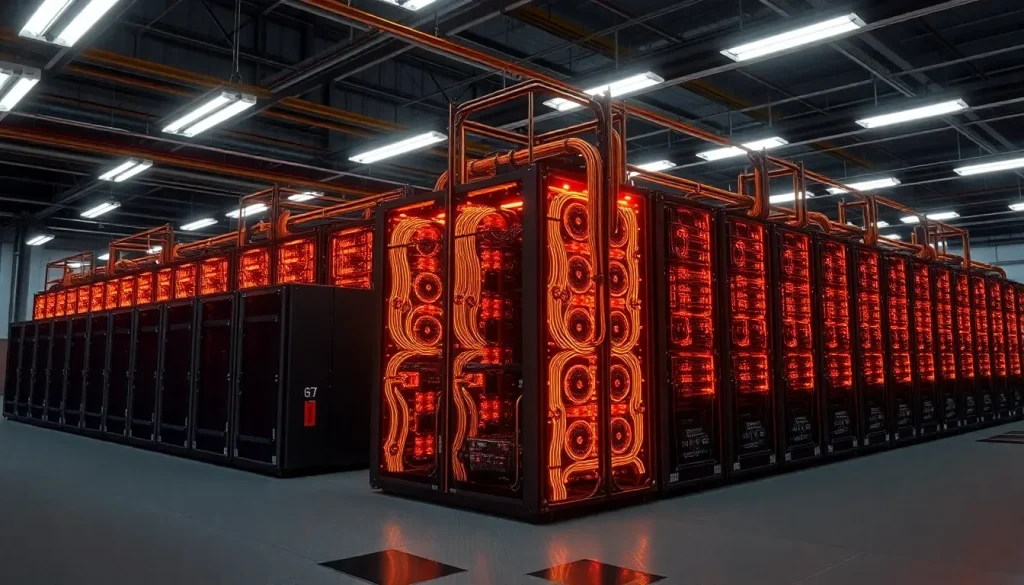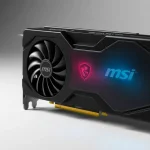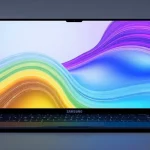Samsung and NVIDIA Partner to Create 50,000-GPU AI Factory

In a groundbreaking move that highlights the importance of artificial intelligence in modern manufacturing, Samsung and NVIDIA are expanding their long-standing partnership. This collaboration aims to establish a state-of-the-art AI factory, set to be equipped with an impressive array of over 50,000 NVIDIA GPUs. This initiative not only aims to enhance production efficiency but also to integrate advanced AI technologies across various sectors, marking a significant leap in both companies' innovation timelines.
This article delves into the details of this monumental partnership and explores the broader implications of their collaboration in the fields of artificial intelligence, semiconductor manufacturing, and robotics.
Samsung to deploy 50,000 NVIDIA GPUs within its AI megafactory
Samsung's ambitious plan to deploy 50,000 NVIDIA GPUs underscores its commitment to revolutionizing its manufacturing processes. According to statements from the companies involved, this deployment is expected to:
"By deploying more than 50,000 NVIDIA GPUs, AI will be embedded throughout Samsung's entire manufacturing flow, accelerating development and production of next-generation semiconductors, mobile devices, and robotics."
The AI megafactory is designed to unify Samsung's complex manufacturing processes into a single, intelligent network. This network will utilize AI algorithms to continuously analyze, predict, and optimize production environments in real-time. Such a comprehensive system is anticipated to significantly enhance operational efficiency and product quality.
Looking ahead, Samsung plans to leverage NVIDIA's accelerated computing capabilities to implement digital twin manufacturing. This involves creating virtual replicas of physical production processes, which will allow for real-time monitoring and analysis. The potential applications of this technology include:
- Identifying anomalies in production.
- Performing predictive maintenance to minimize downtime.
- Optimizing production workflows before implementing changes in the physical environment.
NVIDIA's Omniverse platform, which is pivotal in facilitating these digital twins, offers a robust simulation environment for building and operating 3D applications. By creating these virtual environments, Samsung aims to gain a competitive edge in the rapidly evolving tech landscape.
Furthermore, there are plans to extend the AI factory infrastructure to Samsung's global manufacturing sites, including its facility in Taylor, Texas, which will be crucial for scaling up production capabilities.
Collaborative ventures between Samsung and NVIDIA
The partnership between Samsung and NVIDIA goes beyond just hardware deployment. Their collaboration spans several critical areas of technology development:
- High Bandwidth Memory (HBM4): The companies are working together on HBM4 technology, which combines Samsung's advanced 10nm-class DRAM with a 4nm logic base die, achieving impressive speeds of up to 11Gbps.
- Computational Lithography Enhancements: Samsung has reported a remarkable 20x performance increase in its computational lithography processes by utilizing NVIDIA's cuLitho and CUDA-X libraries for optical proximity correction (OPC).
- Next-Gen EDA Tools: In collaboration with other Electronic Design Automation (EDA) partners, Samsung and NVIDIA aim to develop GPU-accelerated design technologies to streamline the design and manufacturing processes of integrated circuits (ICs) and microprocessors.
- Custom AI Models: Samsung is leveraging NVIDIA's accelerated computing capabilities and the Megatron framework to build bespoke AI models tailored for its specific needs.
- Intelligent Robotics: The partnership also extends to robotics, utilizing NVIDIA's RTX PRO 6000 Blackwell Server Edition and the Jetson Thor robotic platform to enhance operational efficiency in robotics applications.
- AI-RAN Development: Samsung is collaborating with NVIDIA and various stakeholders in telecommunications to advance AI-RAN, a next-generation technology that integrates AI into cellular networks, significantly enhancing performance and efficiency.
The significance of AI in modern manufacturing
The integration of AI into manufacturing is transforming the industry at an unprecedented rate. With companies like Samsung leading the charge, the implications are vast:
- Enhanced Decision-Making: AI systems can analyze vast amounts of data to provide insights that drive better decision-making processes.
- Increased Efficiency: Automation of repetitive tasks and real-time optimization can significantly reduce production times and costs.
- Predictive Maintenance: By analyzing data from machinery, AI can predict failures before they occur, allowing for preemptive maintenance and minimizing downtime.
- Quality Control: AI can enhance quality assurance protocols by identifying defects and inconsistencies in real-time.
As AI continues to evolve, its role in manufacturing will expand, fostering innovation and improving the overall production ecosystem.
Future prospects of Samsung and NVIDIA collaboration
The partnership between Samsung and NVIDIA is poised to set new industry standards. By harnessing advanced AI technologies, both companies aim to:
- Develop next-generation products that leverage AI capabilities.
- Expand their influence in the global semiconductor market.
- Enhance the performance of mobile devices and robotics.
With ambitious goals and a clear vision, their collaboration is expected to yield groundbreaking advancements that will ripple across various sectors, ultimately benefiting consumers and industries alike.
For a deeper dive into the implications of AI in various fields, check out this insightful video on the transformation of technology through AI:
The advancements in AI and its integration into manufacturing processes signify a pivotal shift in operational paradigms, setting the stage for future innovations and breakthroughs in technology.




Leave a Reply